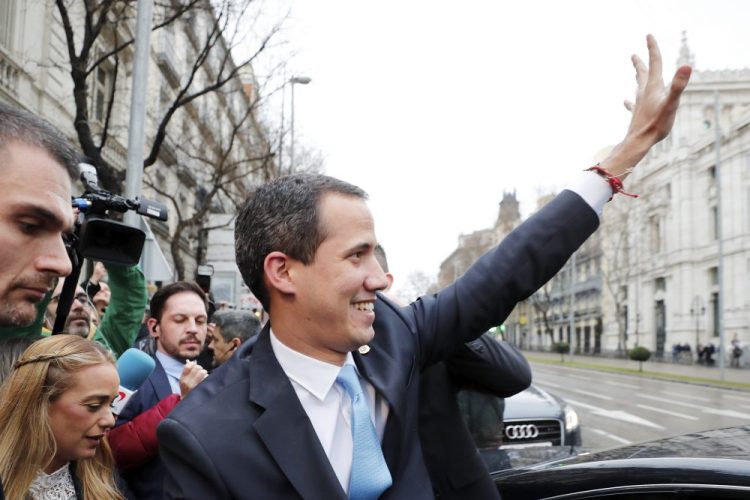PALM BEACH, Fla. — President Trump opted not to attend a Miami rally in support of Venezuelan opposition leader Juan Guaidó on Saturday, although he is spending the weekend nearby at his south Florida resort.
White House press secretary Stephanie Grisham confirmed that Trump would not attend, dashing hopes held by Guaidó and his advisers that the U.S. leader would use the opportunity of proximity to send a powerful message of solidarity with the embattled figure the United States recognizes as Venezuela’s head of state.
Guaidó had hoped to meet Trump in person for the first time during a risky trip outside Venezuela, where he bucked a travel ban imposed by President Nicolás Maduro.
After a rumored meeting in Davos, Switzerland, earlier this month did not occur, Guaidó’s backers had expressed hope that Trump would travel from his Mar-a-Lago resort to attend a rally with Venezuelan expatriates in Miami.
Trump’s absence at the rally will be read as a snub after political setbacks for Guaidó, in whom the Trump administration invested hopes for a peaceful overthrow of the hard line socialist Maduro government.
Grisham did not expand on Trump’s decision. He spent much of Saturday at his Trump National Doral Golf Club near Mar-a-Lago and tweeted a photo of himself in golf togs.
Less than an hour away in Miami, Guaidó mingled on decidedly friendly territory. Some of his most vocal backers include the state’s two Republican U.S. senators, Marco Rubio and Rick Scott, as well as Venezuelan exiles based in the city and its environs.
More than 200,000 Venezuelans have settled in South Florida since 2014, according to a 2018 University of Miami study.
For Guaidó, who had already had face time with Secretary of State Mike Pompeo and Trump’s daughter and adviser Ivanka during his two-week global jaunt, a meeting with the president was considered an essential moment of his trip.
Trump has at times appeared less engaged on the Venezuelan political and economic crisis than hawkish members of his national security team. But his in-person endorsement would do much to bolster Guaidó’s image at home, where he has faced a population increasingly frustrated over the opposition’s inability to quickly follow through on its promise to force Maduro out.
“Everyone would (have questioned) Guaidó’s leadership,” said Dimitris Pantoulas, a Caracas-based political analysts. The majority of the opposition are placing their hopes “primarily on the support the United States can give” Guaidó, he said.
Guaidó two weeks ago defied a government imposed travel ban, spiriting out of Venezuela into Colombia. Over the past two weeks, he met with heads of state, including Colombian President Iván Duque, British Prime Minister Boris Johnson and French President Emmanuel Macron, in an effort to “consolidate the support of the world to achieve freedom for Venezuela,” he said when he arrived in Bogota on Jan. 19.
Last week, Guaidó meet Canadian Prime Minister Justin Trudeau. But at a time when his opposition is facing a more aggressive attacks from the Maduro government as well as internal betrayals and corruption charges, a meeting with Trump remained the image boost he needed.
Guaidó’s tour has thus far not yielded significant and concrete promises of more sanctions from European governments. But, in an interview with The Washington Post on Friday, he described the trip as a success nonetheless, in part because he was able to offer firsthand accounts to Europeans about the hardships and repression in Venezuela.
He also pitched the continent, albeit without a final resolution, on shutting down the shipment of illegally mined gold from Venezuela’s south to Europe, an operation the Maduro government has allegedly been pursuing to sustain itself.
“It was worth the risk in my case for several reasons,” Guaidó said. “The first one is to make visible the magnitude of the crisis. It is no small matter: There are 5 million refugees and 7 million Venezuelans at home facing a humanitarian emergency.
“The second, as you know, is what the dictatorship has been doing with the trafficking of Venezuelan gold,” he added. “That it is blood gold because it finances irregular groups, because it displaces indigenous communities.”
The trip marks Guaidó’s first since he left Venezuela for Colombia last February to help lead a largely failed effort to push massive amounts of humanitarian aid from the United States and elsewhere into Venezuela.
He was allowed to return then without facing arrest, despite the travel ban against him.
“With this tour, Guaidó put the Venezuelan theme back on the international agenda,” Pantoulas said. “This tour put the name Guaidó in the mouths of Venezuelans again. There is, without a doubt, a resurgence of his popularity inside and outside the country.”
Send questions/comments to the editors.



Success. Please wait for the page to reload. If the page does not reload within 5 seconds, please refresh the page.
Enter your email and password to access comments.
Hi, to comment on stories you must . This profile is in addition to your subscription and website login.
Already have a commenting profile? .
Invalid username/password.
Please check your email to confirm and complete your registration.
Only subscribers are eligible to post comments. Please subscribe or login first for digital access. Here’s why.
Use the form below to reset your password. When you've submitted your account email, we will send an email with a reset code.